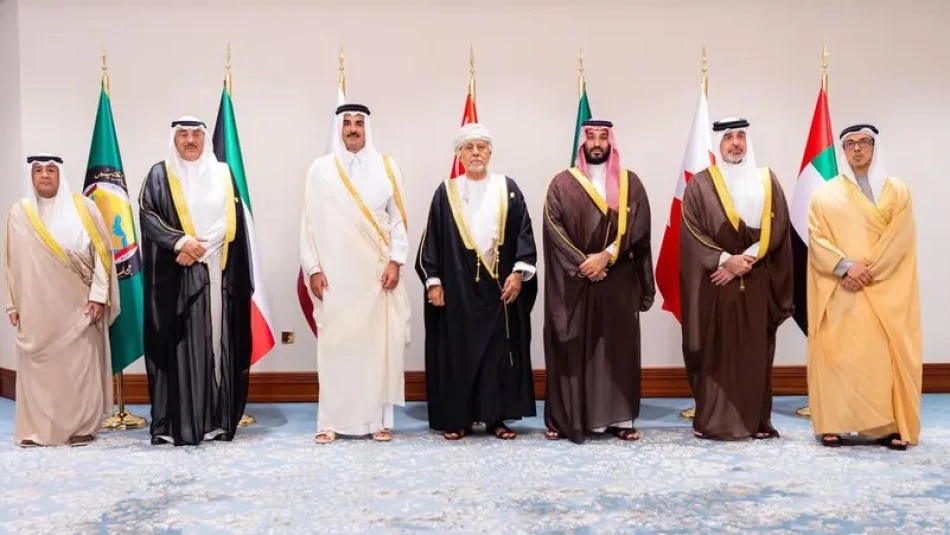
Gulf Summit Statement: Activating Joint Defense Mechanisms and Deterrence Capabilities
Gulf States Rally Around Qatar After Israeli Sovereignty Breach, Triggering Regional Defense Response
Gulf Cooperation Council leaders have issued an unprecedented call for collective defense measures following what they termed a "flagrant Israeli violation" of Qatari sovereignty, marking a significant escalation in regional tensions and potentially reshaping Middle Eastern security dynamics. The emergency summit in Doha concluded with directives for urgent defense council meetings and enhanced regional deterrence capabilities.
Emergency Summit Delivers Strong Unified Response
The emergency Gulf summit held in Doha produced a forceful final statement that went beyond typical diplomatic language, explicitly condemning Israeli actions and calling for immediate activation of shared defense mechanisms. The summit's conclusions represent a rare moment of unified Gulf positioning on a security matter involving Israel, particularly significant given the recent normalization agreements between Israel and several Arab states.
The final communique specifically emphasized the need to "take necessary measures to activate joint defense mechanisms and strengthen Gulf deterrence capabilities," while directing the Joint Defense Council to convene an urgent meeting in Doha.
Regional Security Architecture Under Pressure
Testing the Abraham Accords Framework
This incident creates a complex diplomatic challenge for Gulf states, particularly the UAE and Bahrain, which normalized relations with Israel through the Abraham Accords in 2020. The unified condemnation suggests that bilateral normalization agreements may not override collective Gulf security concerns when sovereignty violations occur.
The timing is particularly sensitive as Saudi Arabia has been gradually warming relations with Israel, with normalization talks reportedly progressing behind the scenes. This incident could complicate those discussions and force Riyadh to choose between regional solidarity and potential Israeli partnerships.
Deterrence Capabilities in Focus
The emphasis on enhancing "Gulf deterrence capabilities" signals potential military and security cooperation escalation. Historically, the GCC's Peninsula Shield Force has remained largely symbolic, but recent regional threats from Iran and non-state actors have pushed Gulf states toward more substantive defense integration.
This development mirrors similar collective defense activations seen during the 2019 attacks on Saudi oil facilities and the ongoing Yemen conflict, suggesting the Gulf states are treating sovereignty violations with increasing seriousness regardless of the perpetrator.
Implications for Regional Stability
Qatar's Strategic Position Reinforced
The unified Gulf support for Qatar represents a significant diplomatic victory for Doha, particularly following the 2017-2021 blockade by several GCC members. The hosting of both the emergency summit and upcoming defense council meeting in Doha underscores Qatar's restored position within Gulf security architecture.
This solidarity also strengthens Qatar's hand as it continues to play mediator roles in regional conflicts, from Gaza negotiations to Taliban relations, positioning itself as an indispensable regional player.
International Response and Broader Consequences
The Gulf states' call for international condemnation creates pressure on global powers to take positions on the incident. For the United States, which maintains strategic partnerships with both Israel and Gulf states, this presents a delicate balancing act similar to challenges faced during previous regional crises.
The incident also occurs against the backdrop of broader Middle Eastern realignment, with China and Russia increasingly active in Gulf diplomacy. How international partners respond could influence future Gulf strategic orientations and partnership priorities.
Economic and Strategic Calculations
Beyond immediate security concerns, this development carries economic implications for regional trade and investment flows. Qatar's massive natural gas exports and strategic shipping lanes make Gulf unity on its sovereignty protection economically rational for all member states.
The unified response also demonstrates that despite ongoing competition between Gulf states in areas like renewable energy investment and financial services, core security threats still trigger collective action mechanisms established decades ago but rarely tested in practice.
Most Viewed News

 Sara Khaled
Sara Khaled






